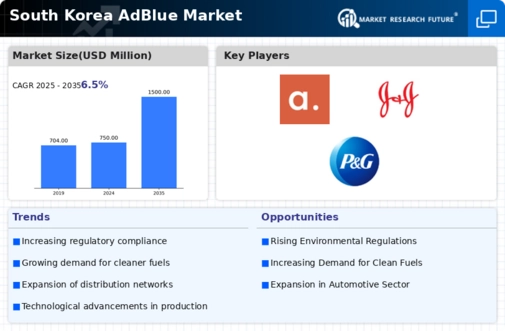Market Growth Projections
The Global South Korea AdBlue Market Industry is projected to experience substantial growth, with estimates suggesting a market size of 1500 USD Million by 2035. This growth trajectory is underpinned by various factors, including increasing diesel vehicle registrations, stringent emission regulations, and technological advancements in emission control systems. The anticipated compound annual growth rate of 6.5% from 2025 to 2035 further illustrates the market's potential. Such projections indicate a robust future for AdBlue, positioning it as a vital component in the automotive industry's shift towards sustainability and compliance with environmental standards.
Rising Diesel Vehicle Population
The Global South Korea AdBlue Market Industry is bolstered by the increasing population of diesel vehicles, particularly in commercial sectors such as logistics and transportation. As diesel engines are prevalent in heavy-duty vehicles, the demand for AdBlue is likely to rise correspondingly. The growth in the diesel vehicle segment is anticipated to contribute to the market's expansion, with projections indicating a market size of 1500 USD Million by 2035. This trend underscores the necessity for effective emissions control solutions, positioning AdBlue as a critical component in meeting both regulatory requirements and consumer expectations for cleaner diesel technology.
Supportive Government Initiatives
The Global South Korea AdBlue Market Industry benefits from supportive government initiatives that promote the use of AdBlue in various sectors. The South Korean government has introduced incentives for companies adopting cleaner technologies, including subsidies for the purchase of AdBlue and investments in infrastructure to support its distribution. These initiatives are expected to stimulate market growth, fostering a favorable environment for the adoption of AdBlue. As the industry evolves, such government support could be pivotal in achieving the projected market size of 750 USD Million by 2024, reinforcing the commitment to sustainable transportation.
Increasing Environmental Regulations
The Global South Korea AdBlue Market Industry is experiencing growth due to stringent environmental regulations aimed at reducing nitrogen oxide emissions from diesel vehicles. The South Korean government has implemented policies that mandate the use of AdBlue in commercial vehicles, which is expected to drive demand significantly. As a result, the market is projected to reach 750 USD Million in 2024, reflecting a growing awareness of environmental sustainability. This regulatory push not only encourages the adoption of cleaner technologies but also aligns with global trends towards greener transportation solutions, thereby enhancing the market landscape.
Growing Awareness of Air Quality Issues
The Global South Korea AdBlue Market Industry is also driven by increasing public awareness regarding air quality and its health implications. As urban areas in South Korea face challenges related to air pollution, there is a heightened demand for solutions that mitigate harmful emissions from diesel vehicles. This societal shift towards prioritizing cleaner air is likely to propel the adoption of AdBlue, as it plays a crucial role in reducing nitrogen oxides. Consequently, the market is poised for growth, with stakeholders recognizing the importance of integrating AdBlue into their operations to enhance environmental responsibility.
Technological Advancements in Emission Control
The Global South Korea AdBlue Market Industry is influenced by ongoing technological advancements in emission control systems. Innovations in selective catalytic reduction technology enhance the efficiency of AdBlue usage, making it more appealing for vehicle manufacturers and fleet operators. These advancements are likely to improve the overall performance of diesel engines while reducing harmful emissions. As a result, the market is expected to grow at a compound annual growth rate of 6.5% from 2025 to 2035, indicating a robust future for AdBlue as a key player in the automotive sector's transition towards sustainability.













